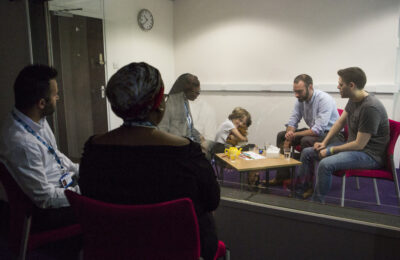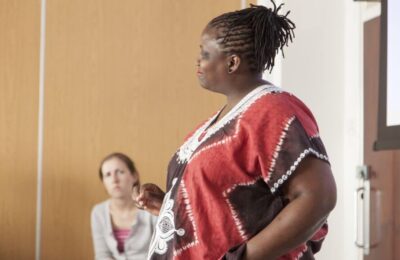Rukiya Jemmott
Senior Systemic Psychotherapist and AFT registered supervisor and Course Lead
“As a child, I felt it wasn’t always straight-forward to talk about the things that were happening in the world all around and that got me interested in talking and listening to people,” says Rukiya. “I think somewhere I understood that children were not understood.
My first career choice was to be an actress I suffered from stage fright so didn’t follow that career path. Funnily a friend who saw me teaching said “Well it’s more of a performance than a lecture”. I think I take part of that acting into my current role. I definitely perform.
I knew that I wanted to work with children, but I didn’t know exactly what I wanted to do. My first training was as a nursey nurse and after qualifying my first job was in a social services day centre for families with children under five who were at risk of being removed. I went into a therapeutic arena and got sparked by sitting and talking and trying to understand things about people’s lives and what had led them to that stage. Following that I went on to do my social work training.
I later worked at the Child and Adolescent Mental Health Services (CAMHS) a day service for children under 14 who were at risk of being removed. The manager there saw the way I worked and thought I would be interested in systemic psychotherapy and she sent me onto the foundation training and went onto qualify as a Systemic family psychotherapist.
When I decided to do my supervision training my supervisor suggested I should look at the Tavi. One of the really important things that I didn’t mention was I’m dyslexic and that put me off. I’m a black woman, I’m dyslexic and I thought, I didn’t want people looking at me like I’m insufficient. Although I had passed three qualifying courses, for all of my previous training I felt like I’ve sat on the edge there was always a fear of being ‘found out’, of being labelled “not good enough.” When I did my supervision interview, my interviewers challenged this and spoke about me putting myself in the centre of the course. I remember leaving the building and walking to the station and thinking ”gosh, I could be at the centre of a course… I could be in the centre of it!”. This felt new and exciting.
I initially avoided the Tavi, as I had some prejudice about training here – I saw it as a bit of an ivory (white) tower. There was an unpleasant incident while on the supervision course but a tutor went out of her way to challenge the racism, I remember thinking that maybe this is somewhere I could work as they were took my experience seriously. So I applied for a job here and here I am. What’s been important is coming here and working with other people who look like me.
If there is any advice I would give to someone thinking about doing a course here I would say bring all of yourself. We are training you with all that you are to take on more. The emphasis here is we don’t want to take away from who you are, we don’t want everyone to sound the same.
I am also a student here studying for my doctorate in advanced practice and research: systemic psychotherapy (M10). One of the things I’m hoping as a course lead and a tutor, is that students who meet me really get an idea of being themselves because I am very much myself. I like to sing…I might sing a bit of my lecture if I feel like it…I like the teaching not to be a straight line but to have all sorts of ingredients, to be rich. I like us to have a cake at the end with different ingredients – that could be people’s cultures, gender identities, sexualities and more whatever it is… I like that very much.
I think there is something rich about a teaching space that can have people from all different parts of the world.”
 Graduate certificate
Graduate certificate 
 Postgraduate certificate
Postgraduate certificate 